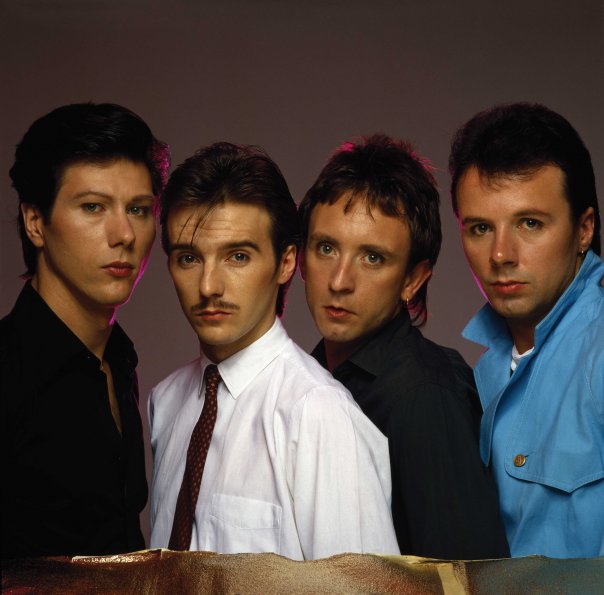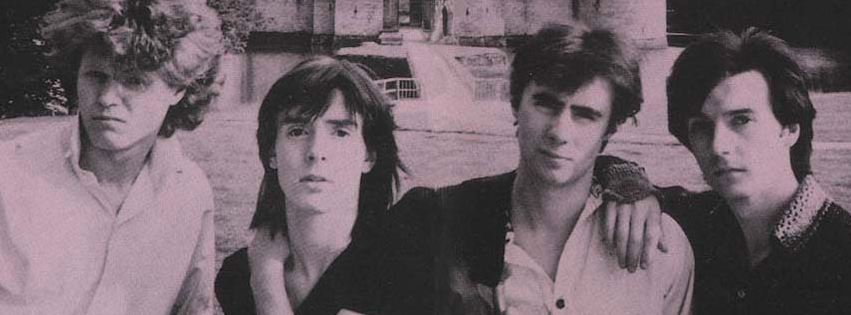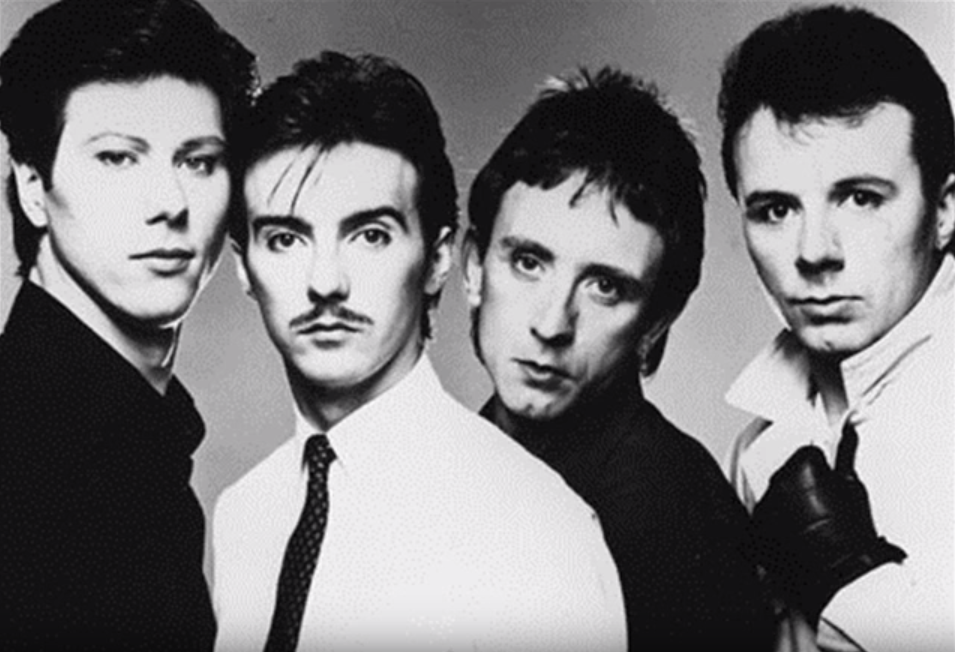
At the end of 1980, if Midge Ure had left London on an overnight sleeper train, returned to the low skies and smoky streets of Glasgow, and never played or sang another note, we would probably still be talking about him. His legacy as an original and accomplished vocalist, songwriter, and conceptualist would have been assured.
That’s because between August of 1978 and November of 1980—a span of time shorter than the shadow of a small god’s eyelash—Midge Ure made three timeless albums.
As a rhythm guitarist, songwriter and vocalist in the Rich Kids (the band formed by former Sex Pistols bassist Glen Matlock), Ure recorded Ghosts of Princes in Towers, a vastly original blend of prog, punk, and pop. Released in August in 1978, Ghosts is crammed with post-Roxy landscaped industrial churns stapled to cascading Pistolian riffs, exquisite melodies, and the dirtiest, slurpiest guitars this side of L.A.M.F.
Less than a year later, Ure was a prime factor in creating, recording, and producing Visage. Their eponymous debut album (recorded in ’79, but not released until November 1980) was a minimalist synth-pop masterpiece. Visage is an ultra-reduction of the Krautrock of Harmonia, Cluster, Kraftwerk, and Roedelius, blended with the kind of simple and catchy melodies a teen girl might come up with. Beeping, pulsing, and deeply catchy, it is one of the most satisfying synth pop albums ever made.
And then there was Ultravox, which Ure joined in 1979.
“I’m a huge believer in naiveté: I think when you’re young and naïve and have a little bit of self-belief—or maybe it’s a cross between self-belief and absolute ignorance!—you just do things, you get in there and go blindly.”
On Ultravox’s Vienna album (June 1980), the post-punk/post-Eno/post-XTC/post-Joy Division user-friendly crankiness of the ‘79/’80 zeitgeist was wedded, blissfully, to Krautrock’s pulse and throb, and the whole thing was given a (truly) epic quality by the soaring, plaintive, deeply tuneful vocals of Midge Ure, who, dammit, was Bono when we still thought Bono was one-half of an old singing duo or two-thirds of a particularly intelligent bisexual primate (i.e., the fabulous bonobo).
And to think: just a 18 months before this incredible streak began, Midge Ure was the adorable, almond-eyed singer for Slik, a hugely popular boy band who attempted to be a deeper and more furrow-browed Bay City Rollers.
And that was all before the end of 1980.
Four years later, Ure composed, produced, and played everything (but the drums) on the second-biggest-selling 45 in British history. (And do you think Fabulous Bonobo is a good band name? I’m not sure.)
Which is all to say that Midge Ure, born 63 years ago in the suburbs of Glasgow, is really a terribly interesting musician. And to bring it full circle, in 2014 Midge Ure released a wonderful solo album, Fragile, a shimmering, shivering mixture of tension, ambience, warm sea-pools of technology and deeply effecting songwriting. It clearly shows that Midge Ure still has a few more chapters to write in his remarkable story.
I recently caught up with Ure over the phone to discuss his incredibly potent late-’70s creative period, his bold new album Fragile, which recalls the slocore-techno work of The Blue Nile, Talk Talk, or even Air, and what it was like working with Phil Lynott and Thin Lizzy.
[youtube https://www.youtube.com/watch?v=kBd2ylOeR-M&w=560&h=315]
Ghosts of Princes in Towers, Visage’s debut, Vienna…you had a helluva run between 1978 and 1980.
You have to imagine that Scotland at the time, where I had been working just a few years earlier, was a bit of a musical bubble. Very isolated. So, given the opportunity to be in London and soak up the atmosphere and be allowed to go into the studio and do what I thought was interesting as opposed to what other people wanted me to do—remember, in Slik I had no control whatsoever—I was like a kid in a toy shop!
So from the Rich Kids, to buying a synthesizer and bringing that into the Rich Kids, which eventually broke the band up, to forming Visage, and then joining Ultravox—it all happened in a very short time period. But it was like someone just put fuel in your tank!
I was allowed to do what I wanted, for the first time ever, and the learning curve, once someone has given you the toys, the tools of your trade, can be exponential! I didn’t take holidays, I didn’t take any vacations, I didn’t have a girlfriend, I was like a workaholic, and why not, the joy of expressing myself! So it was just a great period for me.

I have long considered The Rich Kids one of the greatest one-album bands of all time. Why didn’t it last longer?
I think it was almost an impossible scenario. We were at a moment in time where musical change happened very quickly. I had just come straight out of Slik, a teen pop band, a Bay City Rollers kind of pop thing, and that was blown out of the
So then this technological revolution happens, and we had access to electronics, synthesizers, drum machines, and I thought how cool would it be to use traditional rock instrumentation with guitar, bass, and drums, and have all that energy that the Rich Kids had, but combine that with electronics, combine that with synthesizers!
We did that with “Marching Men” and a couple of other things on the album. But half the band absolutely hated the idea of doing this, and half the band—drummer Rusty Egan and myself—absolutely loved the idea of doing it. So there were massive divides, even at the beginning, even when we started recording the album, when I turned up with a synthesizer. So it was destined not to go beyond that year that we had. It was meant to be a very passionate quick fling.
[youtube https://www.youtube.com/watch?v=NKeGSxUrKPk&w=560&h=315]
I think the first Visage album has stood up really, really well.
I’m really proud of the first two Visage albums. The Rich Kids had all fallen apart under our feet; Rusty and I were listening a lot to what was coming out of Germany—Kraftwerk, and La Dusseldorf, and Neu!, and Can, we were getting very influenced by that—and Rusty said, one night as we were wandering through the streets of London, “Wouldn’t it be great having a band with all our favorite musicians.” And I said, “Let’s do it!”
So we chose the guys from the band Magazine and we chose Billy Curry from Ultravox, those were two of our favorite groups at the time, and put this thing together, Visage. It was a great vehicle for me to get into the studio and experiment with electronics, to experiment as a producer.
And Rusty’s friend Steve Strange wanted to be a singer, so he was put in the position of singer. I left when Steve came to New York and decided to turn up at the record launch on the back of a camel. I decided it was too Disney, it was too silly, and I walked away from it. But those first two albums I spent a lot of time and a lot of effort making, and I was very pleased with them at the time.
[youtube https://www.youtube.com/watch?v=imIW41AmclY&w=560&h=315]
When you joined Ultravox, they were an established band that had released three albums and you were replacing their well-known front man, John Foxx. That had to be a bit intimidating.
To a certain degree, yes. I’m a huge believer in naiveté: I think when you’re young and naïve and have a little bit of, well, not cockiness, but a little bit of self-belief—or maybe it’s a cross between self-belief and absolute ignorance!—you just do things, you get in there and go blindly.
I was a big fan of Systems of Romance, which is the last album Ultravox did with John. Had they managed to carry through with that lineup, I think the next album with that original lineup could have been fantastic, but like the Rich Kids, they burned out very quickly just before everyone grabbed what they were doing and took it further.
When I joined Ultravox, we had to scrape together the money just to get the rehearsal room to see if it would work. And the moment we made a noise, it worked. It was just there. We played a couple of the old Ultravox songs that I knew—of course we didn’t have our own material yet—“Slow Motion,” “Quiet Man,” just to see how it would work, and instantly, we knew it was absolutely perfect, it was just right, and I felt like I had come home; I had walked in the right door for a change.
Somehow, wedged in between the end of the Rich Kids, the recording of Visage, and the start of your time in Ultravox, you ended up joining Thin Lizzy for a while.
Well, I never actually joined Thin Lizzy. I had just joined Ultravox and we were putting the finishing touches to the first Visage album when I got a phone call from Phil Lynott, who was in America opening up for Journey on some mega-tour. And he said, “Look, Garry Moore is not in the band anymore, can you come out tomorrow?”
And I had never been to America so I thought this is just fantastic, what a lovely thing to happen. And I had known Phillip over the years, I was a fan of very early Thin Lizzy and I felt Phillip was incredibly underrated as a songwriter, so I jumped at the chance!
But I knew all the time that it was a short-term fix while I joined Ultravox, and it meant that I could generate some of the income to put Ultravox into the studio and to buy some of the equipment necessary to get us up on our feet.

Phil Lynott was one of the greatest rock stars of all time. Working with him must have been a profound learning experience.
It was. He was like a big brother. He knew I wasn’t into drugs at all—I was scared of drugs, I was scared I’d enjoy it—I should have been scared of alcohol, but I was scared of drugs. So he kind of looked after me, kept an eye out for me, and I respected the fact that he respected the fact that I didn’t want to be as embroiled in that rock ’n’ roll world as he was.
He would also take me with him when he did radio and press and promo, he would have me sit in with him, and after he was finished talking about the tour or the next Lizzy album, he’d say, “Right, Midge, you tell them about Ultravox.”
It was just a fantastic experience. When would I ever get a chance to perform in front of a hundred thousand people on the same bill as Aerosmith and Santana! And because of that, I managed to see and experience what the tail end of that 1970s American rock ’n’ roll circus was all about!
And I would never have experienced that if he had not picked up the phone and asked me to come over and do a job that a million other guitarists could have done a million times better.
In 1984, you and Bob Geldof produced one of the biggest selling singles of all time, “Do They Know It’s Christmas.” It must be totally weird to sometimes realize, “I made the second-biggest-selling British single of all time.”
It’s kind of like an out-of-body experience at times. I can look back and remember the whole process and all that, but it seems like someone else who did it. I mean, I’m sitting in a motel room in Hollywood right now, nothing special but it’s just fine, and I can’t marry the fact that I’m sitting here doing this and I am going to go play to, maybe, 300 people tonight in Sacramento with the fact that I was the same guy who stood on stage at Live Aid.
Sometimes that’s what happens—you have these moments in your life, not entirely of your instigation, where you find yourself in these scenarios where you go, wow, this is great…and a year or so later, you’re out there again, because you’re a working musician. It’s a great life. I didn’t ask for the “big” stuff; the big stuff came [laughs], sometimes that’s the way it works, sometimes if you’re lucky and the finger points at you, you get your 15 minutes of fame.
[youtube https://www.youtube.com/watch?v=YKCUlBt_Msk&w=560&h=315]
I know this may be hard for you to comment on, but I always thought there was a subtlety and humility to “Do They Know It’s Christmas” that the American equivalent of the song, “We Are The World,” doesn’t have. I mean, the American version basically says, hey-ho we are famous and we are gonna save the world! Your version says, be thankful you are in your shoes and do what you can to help.
I have to watch what I’m saying because I don’t want to upset people, but there is a divide. Band Aid was very indicative of what was coming out of the U.K. at the time, wasn’t it? It sounded a bit like Visage or Ultravox. It was dark. There’s a lot of darkness to it—the whole opening section is miserable! It had to be, it had to reflect what was going on, though of course it had to finish with this kind of sing-a-long thing. It’s a really strange structure.
Whereas “We Are The World,” well, was a very Americanized, well-executed piece of songwriting, kind of like something done specifically for the American market, whereas what we did was what we do. That’s it. I’ve said this for 32 years: if we didn’t have the artists that we had joining us to make that record, that record probably would never have seen the light of day.
It was a very uncommercial record. But we did it first, we did it quite a few months before USA for Africa, so it was very much a U.K. statement from artists who strive to make things different, do things differently.
[youtube https://www.youtube.com/watch?v=bjQzJAKxTrE&w=560&h=315]
You are still very involved in Band Aid Trust, aren’t you?
I’m still a trustee, absolutely. Here’s the stupidity of the whole thing: When we made the record, ‘Do They Know It’s Christmas,’ all we thought about at the time, and this is how blinkered our vision was, was a six-month period. We never, ever thought that that record, because it was a Christmas record, would get played the year after, and the year after that, and the year after that, and ad infinitum, generating income for the Trust.
It hadn’t crossed our minds at all that this would go on for 30-odd years. So yes, we are still very much involved! And at some point in the future, Bob and I are going to have to sit down and discuss what we’re going to do, because that record will carry on getting played and that money will carry on getting generated but we might not be around to oversee how it’s spent and where it goes.
It’s fine raising money, but if you want to do good with that money, you’ve got a couple of ways of doing it: you either set up your own infrastructure and determine where you want that money distributed, which means you have to pay wages—but that was out, since we had originally said, “You give us a pound, we’ll send that pound to Africa.”
So we set ourselves up as a kind of draw-down facility, a bank, so the Red Cross or UNICEF or Save The Children come to us with a proposal saying, “We need to do this, we need to build that, we need to buy whatever,” and we will look at it, and if it fits into our brief, we will actually buy the material, and they are paying the wages to get someone out there. That’s what we do. It’s the only way we can do it and have successfully done it for the 30 years we’ve been doing it.
[youtube https://www.youtube.com/watch?v=rRZeG0-AVTY&w=560&h=315]
Fragile is a very, very impressive album.
If you want to hear possibly the best songwriting I’ve ever done, if you want to hear something that is absolutely brutally raw and honest but palatable, Fragile kind of says it all. I played everything, I engineered it, I mixed it, I did the entire thing.
Funny—you began in Slik, an almost completely manufactured and controlled band, and here you are releasing records you make entirely by yourself.
You have to stick by your guns. I started out in a situation I couldn’t control, and I vowed at the end of Slik that I would never, ever allow myself to be back in that situation. If that means I have to give up commercial success to keep up musical success, I’m more than willing to do that.
That’s why I’m sitting here and not in Beverly Hills. I chose my weird and wonderful route and I’m sticking by that, and I have absolutely no regrets whatsoever, and along that route, every so often something will peak or something will pop out that would never have popped out if I had chosen the commercial route.
Midge Ure plays 3Ten in Austin in Friday, January 20; Dan’s Silver Leaf in Denton on Saturday, January 21; and the City Winery in Nashville on Monday, January 23.

